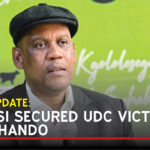The Voice pioneer recounts memories of the newspaper’s formative years
A good heart stopped beating last Wednesday morning.
The Voice founder and former Managing Editor, Donald Laurence Moore, breathed his last after he and a friend, Emmanuel Manferrari, tragically drowned at Morgan’s Bay in the Eastern Cape, South Africa.
As eulogies continue to pour in and his gentle soul ascends to heaven, we join friends and the Moore family in reliving his memories by reproducing the last interview he did when he spoke to Innocent Tshukudu about his life and times with the paper, the headlines and stories, the struggles, his partnership with Beata Kasale, Tafic Football Club, the state of journalism, sjamboks, naked ladies and more!
It is mid afternoon as we locate Don Moore in the shaded serenity of his favorite eatery, Cafe Dijo, at Kgale Mall during one of his occasional visits to Gaborone.
He is equally as excited to see us and he puts aside the latest copy of his UNCUT rock’n roll magazine and stands up to welcome us. Nothing much has changed about our ‘old-timer’ since his retirement a few years ago, except for his body which is slightly bent in the manner of one used to climbing hills and his hair, which is now long and bleached against the grey, flowing like the waves he talks about when describing his home beside the sea. It is a place he calls Paradise and it’s a place he has gone to in his life after The Voice.
The cappuccinos have been ordered, I’m here with Tsitsi Kasale, our techno guru and mutual friend, we’re seated sharing smiles and ‘good to see you again’ greetings.
“I love it here and used to sneak out a lot when working this side,” he tells us, launching into an account of a story he did with the cafe’s owner when he first took over the place.
“He came up and shook my hand and said, ‘Hi I’m Wilhelm and I’m gay.’ I replied, ‘Hi I’m Don and I’m not – but I’m here to interview you’, and man what a great intro!”
Which seems like a good enough place for us to start.
*What was the inspiration behind starting The Voice newspaper?
After my primary school teacher once wrote on a school report that I was ‘good at English,’ I kind of imagined that when I grew up I was going to be a journalist. It was a toss up between that and becoming a train driver.
But in England the reality is that a lot of people are ‘good at English’ and over there the ratio between ‘wanna be’ journalists and jobs is about 10, 000 to 1. Regrettably, despite having an interview for a position at the Daily Mirror, I was not one of the chosen few.
So I became a teacher and ended up coming to Botswana – after a short sting in Nigeria – to teach English at Mater Spei College.
There I came across a group of students who were also ‘good at English’ and had the same dream of one day becoming journalists.
So we formed a Journalism Club and worked together on reviving the school magazine. And that’s where it all started.
*How did you turn the dream into a reality?
The school magazine was called ‘The Mater Spei Times’, but previous editions had concentrated on matters exclusive to school life.
We wanted to turn it from an inwardly looking publication to an outwardly looking magazine that explored the relationship between the school and its surrounding society.
The results were both successful and controversial. We sold 2, 000 copies before the school authorities ended up banning it!
But the journalism bug had bitten and in the long story of what happened next, that was the foundation upon which The Voice was built.
*How did that lead to The Voice?
Building on the enthusiasm of the Mater Spei experience, I gave up teaching and started work on The Francistowner Magazine.

After four editions and a circulation of around 3, 000 we were gradually making our mark on the local scene.
Unfortunately the artistic success did not match the financial expectations of the three former students who had joined me, and they left to start more lucrative careers. They quit to become famous in their own right.
By this time I had been joined by three out of work local journalists who talked me into changing The Francistowner from a magazine into a newspaper.
This we christened The Francistowner Extra and printed at The Chronicle in Bulawayo.
Again funding was a challenge. My mum who had been helping me financially, was becoming increasingly skeptical about bailing out what she saw as a sinking ship.
After paying the printing bills there was not much cash left to support the lifestyle of hardworking, but fun loving, local journalists.
The dream was turning into a bit of a nightmare. What revived it was meeting Beata Kasale.
* So how did the business partnership with Beata Kasale come about?
I was contemplating a change of direction and giving up the struggle to make the ends meet the means.
Then one day, into the cramped confines of the rented room we called an office, bounded this colourful, larger than life figure.
She held out her hand with an amused smile and the historic greeting, “Hi I’m Beata Kasale and I’ve been sent to help you.”
I looked at her in a mixture of shock and wonder, but knew then that the Messiah had come.
It was love at first sight!
I explained that I didn’t have funds enough to pay for her considerable talent and experience, but was prepared to share the company with her on a 50/50 basis.
We shook hands and prepared to launch our newspaper on the unsuspecting public, becoming proud parents of the baby we came to call The Voice.
*Do you think society was prepared for a newspaper of The Voice’s calibre when it hit the shelves 25 years ago?
The time was right to launch a local newspaper similar in style to the British tabloid The Mirror.
The press that existed then I thought was too conventional for popular interest, concentrating as it did on the dry bones of politics and business.
The idea of The Voice was to be both informative and entertaining. Big headlines, big pictures and shorter stories was the way to go.
Our subject matter looked at life as experienced by what the Americans call ‘the average Joe’ and the circumstances that made news in the realities of their daily lives.
The ‘man in the street’ made the headlines and their stories turned from the ordinary into the extraordinary on our front pages.
We were the first newspaper in Botswana to use full color, and ‘colourful’ is probably the word most used when people come to describe The Voice.
We branded ourselves as ‘The Newspaper for a Brighter Botswana,’ and I believe we have brightened up the lives of the reading public over the years.
At one stage we were typecast as the ‘Thokolosi paper,’ but I didn’t take that as a criticism. I saw it as an acknowledgement that we were writing about matters of popular interest.
*How was The Voice received?
Perhaps that is best summed up in a scene from the early days when I saw this well dressed guy leaving a shop having bought a copy of The Voice.
As he came out, he glanced around furtively as if he was looking to see if he was being followed.
Then with a smile, concealed The Voice between copies of Mmegi and The Guardian.
In later years it sort of depressed me that despite the many stories we carried exposing social injustice, demanding action from politicians, one of the few times the paper was discussed in Parliament was in a heated debate over the merits of the models that appear on our Page 3. Such is life. It’s still a challenge.
*What are those challenges?
One of the initial challenges was to change conventional ideas of what constituted news.
I remember once during a coffee break overhearing an animated exchange between our reporters.
One was telling the other, with much amusement, about how he had seen this naked woman running along the road next to his house pursued by another woman shouting and trying to beat the hell out of her with a sjambok.
Apparently the whip-wielding woman had come home to find her hubby in the matrimonial bedroom with the maid.
They were both naked so the guy couldn’t even claim he was helping her make the bed.
So I asked the reporter- his name was Lawrence Tsondayi, if he had written the story for the paper, to which he replied, “Oh is that a story? I didn’t think it was news!”
I explained that it was, and more relevantly it was the kind of story that The Voice wanted to tell.
It was what people are talking about, and was of interest to them.
Those were the days before stories trended on social media, and I knew we were on the right track when I heard someone telling a friend about some local scandal and asking, ‘Have you heard?’ the other replied, ‘No, I’ ll believe it when I read about it in The Voice.’
*How difficult was it training your own personnel when there were limited training opportunities for journalists in Botswana during the company’s formative years?
In those days the University of Botswana had not started its Media Department, so there were no formal institutions for training journalists in the country.
As The Voice grew and we took on more staff, the search began to find more budding reporters.
We knew they would come with little or no training, but we were looking for people with enthusiasm for writing, prepared to work on their craft.
We wanted people with the desire and passion to match the vision we had for The Voice.
It’s still the same today and in many ways despite the training now available, its even harder to find people with hunger and motivation.
*Did you enjoy training journalists?
Very much so. I enjoyed the training part because it involved an exchange of ideas and exploring how to tell stories in a way that made an impact.
I liked sharing my love of journalism with others who had the same passion and hunger.
Working as a coach with journalists was a great way of exploring possibilities and indulging my own interests at the same time as helping others.
Many expatriates come to Botswana but never get to witness life outside their limited social circle.
I am very grateful to The Voice for providing me with a gateway to a different reality, deepening my love for the country and helping me form a relationship with its good, and sometimes bad, people.. it was an exploration of the soul!
*There obviously wasn’t much revenue generated compared to today.
Yes there have been hard times – times when we struggled to put the proverbial bread on the table but the journey has been worth every missed meal.
There’s a great quote from one of the legends of the boxing ring, Jack Dempsey, which explains what I mean. It goes: “When I was a young fellow I was knocked down plenty. I wanted to stay down but I couldn’t. I had to collect the two dollars for winning or go hungry. I had to get up. I was one of those hungry fighters. You could have hit me on the chin with a sledgehammer for five dollars. When you haven’t eaten for two days you’ll understand.”
Most of the time it was Beata and myself who went hungry – but we always did our best to pay staff on time and keep people happy.
*How did you keep the staff happy and inspired?
As far as motivation is concerned, I hope that as a journalist seeing your by-line in the paper has its own rewards, and as an incentive to clock on everyday, for staff to say with pride, “I work at The Voice”.

I am certainly very proud and honoured to have been part of that family.
*Do you think print media can still survive and thrive in the advent of new media, where breaking news is published as it happens, by anyone with a smartphone?
I know I’m old fashioned, but I love the intimacy of a newspaper in my hands. I could never get used to touch screen gratification and can’t face Facebook.
Having said that I realise this is where the media is going and where we need to be if we are to have a future in the news business.
If we are to grow our circulation the challenge is to turn our many fans on social media into avid readers.
With social media you tend to get only snippets of conversation, and much of that is opinion rather than news.
But every media concern needs to take note of the aspirations and concerns of its audience, and must adapt to new ways of doing that.
I have my own ideas on how that can be achieved but am reluctant to come back to work to try them out.
I have retired and relocated to the Wild Coast of the Eastern Cape. These days I stare at ocean waves rather than lines on a computer screen.
But we have a great team of media technicians who understand the workings of these things far better than I do, and I’m sure they will come good.
However the principles of good journalism remain the same, and I believe Arthur Millers adage that, “A good newspaper is a nation talking to itself,” is still applicable. It is how we package that conversation that will be key to our survival.
*What have been your best and worst memories running the newspaper?
Hey, do you want this interview to turn into a novel!
In fact I am writing a book based on an experience at The Voice, and it is a long tale. It has various working titles– among them “Heaven Can Wait, Fire Under Fantasy, and Even Dirty Old Men need Loving,”- but that’s another story. Perhaps you will have to wait for the book, but I’m a slow writer and I don’t know how munch time there is left.
But yes, there have been great memories – many have come accompanied with words of praise and some have come with the brutality of bricks.
But even the bad times have been good and I have no regrets.

As a football lover and ‘wanna be’ Jose Mourinho, I enjoyed the year working with Tafic and interacting with players and supporters, even if between me and The Voice the experience cost us over P1million.
I was flattered when they offered me the Chairmanship, but it was an honour I simply could not afford.
But if I was to choose just one memory to cover the best and worst it would be of my business partner, great friend and loving sister, Beata, who sadly has not lived to enjoy the celebration of our 25 years.
From that first joyous meeting to the last briefed goodbye, her memory will be with me forever. I’m eternally grateful for what she did for me and her role in the story of my life. I miss her so much. But she remains a legend, and The Voice our legacy.
*What has been the key to the newspaper’s success?
One of the fundamentals to finding the formula for success was listening to the strange tales that we were being told.
What other newspapers might dismiss as gossip we turned into headlines.
Journalism is a craft and I believe The Voice has carved its place in the life of the nation, and will continue to play an important role in the community and live up to its name.
Movie director, Alfred Hitchcock once said, “A great story is life with the dull parts taken out,” and I hope that within the confines of the truth, and with the guidance of our great editorial staff led by its acclaimed editor, Emang Bokhutlo, who has been with The Voice from the early days, we will continue to be a testimony to that gospel.
*Anything else you would like to share about your association with The Voice?
This feels like something that should come at the end of a speech when you do your closing remarks.
But I hope this interview doesn’t come across as speechifying; the ‘been to’ ramblings of a pompous old fart or as the prompt suggested by one local newspaper, “For more fun, read the adverts!”
I would however like to end by offering my great thanks and gratitude to our loyal readers and advertisers who have stuck with us over the years.
Without you none of this would have been possible. Keep up the good work and keep reading.
Goodbye and God bless.
PULA!

















